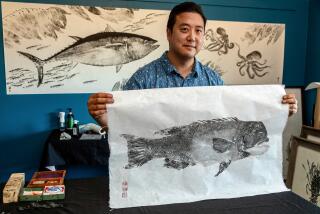This year’s Oxford Symposium, held at St....
- Share via
This year’s Oxford Symposium, held at St. Antony’s College, Oxford, July 19-20, started out with an impassioned scientific statement destined to be a T-shirt. Retired Oxford physics professor Nicholas Kurti and American food science writer Harold McGee issued a joint declaration that, contrary to the “Canadian rule” given in countless books, a 2-inch-thick slice of fish takes four times as long to cook as a 1-inch-thick piece, not twice as long. Reason: The heat not only has to cook twice as much meat, it has to travel twice as far to do it.
By the end of the Symposium, you could sign up for a fish cooking T-shirt. This principle--that the cooking time of fish (or anything else) varies according to the square of its thickness--would be printed on the front . . . and supporting charts of experimental data on the back.
It was the 15th Oxford Symposium, and this unique foodie gathering remained as it always has been, pretty much in the scholarly category but scarcely academic at all. When it came time for the panel discussions, Kurti refused to begin his panel on time because he insisted on attending the start of a simultaneous panel at which Dr. Peter Barham was presenting a paper on lutefisk titled “Cooking With Drain Cleaner” (lutefisk being a Norwegian specialty of fish treated with lye). Kurti may have been tipped off that two Norwegian scholars had taken high exception to the paper and were going to present Barham with a plaque declaring him an LMD, or Doctor of Lutefisk Mythology.
Among other highlights, Robert Chenciner reported that in 1993 he was offered the British monopoly on caviar from Daghestan, a former Soviet--now Russian--republic on the Caspian Sea. The offer came from a friend named Gamid Gamidov, a wrestling champion who had became Daghestan’s finance minister and was assassinated last year by a remote-controlled car bomb. Chenciner mentioned that a newly rich neighborhood of the Daghestani capital, Makhachkala, is known as Beverly Khills.
Richard Hosking, an Englishman who has lived in Japan for 24 years, presented a paper on goldfish sushi. Not made from the aquarium type of goldfish, he hastened to add, but from wild goldfish.
And it isn’t the familiar sushi of raw fish on a lump of rice, which has been made only for the last 170 years or so. Goldfish sushi belongs to a class of sushi that has been recorded for a thousand years, one for which salt-pickled fish are stuffed with cooked rice and then pickled in salt for a couple of months more. You actually throw the rice away when you eat this sushi.
Dutch scholar Janny de Moor, reporting on fish in the ancient Middle East, let drop the fact that an intrepid archeologist named Salima Ikram had actually tasted dried fish from an Egyptian tomb (no word on how good it was). The Babylonian term for squid, De Moor revealed, literally means “arrow with two beautiful eyes.”
Harold McGee’s paper had the most beautiful title: “The Buoyant Slippery Lipids of Escolar and Orange Roughy.” Its subject was the fat-like substances certain deep-sea creatures secrete in their tissues to give them buoyancy, the most efficient compounds being the ones known as wax esters. The paper revealed that, theoretically, very large quantities of orange roughy might have a laxative effect because its flesh contains these indigestible esters.
McGee emphasized that orange roughy and escolar (also known as butterfish) probably pose no real danger. However, another deep-ocean fish, Ruvettus pretiosus, contains so much wax esters that its colloquial name is castor oil fish.
Colleen Taylor Sen presented the most charming paper. In the Indian state of Bengal, she said, the bride’s friends visit the groom’s house a few days before the wedding, bearing gifts and a large carp decorated with flowers and wrapped in a sari. In neighboring Bangladesh, the “bride” fish’s lips are often painted with lipstick and it is often accompanied by a “groom” fish with a cigarette dangling from its mouth.






